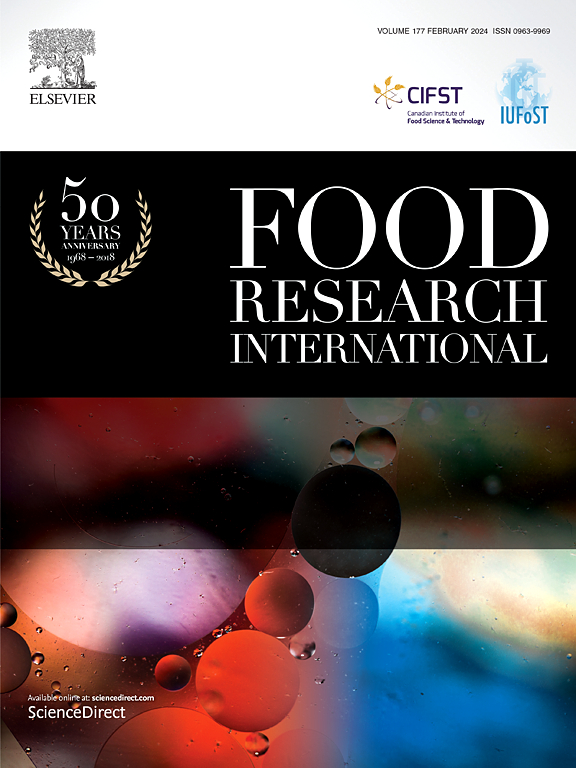Novel artificial bulk fat based on lipid droplet and carboxyl-modified konjac glucomannan: Preparation, characteristics and probiotic function
IF 7
1区 农林科学
Q1 FOOD SCIENCE & TECHNOLOGY
引用次数: 0
Abstract
Fat substitutes that possess texture, processing and sensory properties similar to animal fats, without increasing the burden of fat intake has always posed a significant challenge for food industry. Herein, a high quality artificial bulk fat containing lipid droplet and modified polysaccharides was developed as novel fat substitute by brush coating method. The artificial lipid droplets were constructed with L-α-phosphatidylcholine and plant-based lard substitutes, resulting in a high yield and good dispersion. Carboxyl-modified konjac glucomannan (CAKGM) was prepared as a novel fat tissue mimic matrix, exhibited stronger metal ion chelation, improving colloid hardness and cohesion, compared with nnature KGM. Furthermore, the impact of lipid droplets and different polysaccharide formulations (CAKGM, SSOS and sodium alginate) on the texture properties of fat mimetics was investigated. When the polysaccharide matrixes were 60 g/L CAKGM, 70 g/L starch octenyl succinate, 50 g/L sodium alginate, and 50 g/L CaCl2, the texture properties of block fat mimetics were consistence with pork back fat. Simultaneously, the fat mimetics, with low fat content with 7.54 % (w/w), maintained excellent structural stability and thermal performance after boiling and frying. Besides, in vitro simulated digestion models showed that the artificial bulk fat can resist digestion by saliva, gastric juice and intestinal fluid. In vitro fermentation of healthy human fecal bacteria with artificial bulk fat enriched beneficial bacteria such as Lactobacillales, Enterococcaceae and Bifidobacteriales, producing short-chain fatty acids to maintain human intestinal health. Overall, artificial bulk fat developed in this study has potential applications in healthy, nutritious and functional plant-based meat products.
基于脂滴和羧基改性魔芋葡甘露聚糖的新型人工脂肪:制备、特性及益生菌功能
脂肪替代品既具有与动物脂肪相似的质地、加工和感官特性,又不会增加脂肪摄入的负担,这一直是食品工业面临的重大挑战。本文采用刷涂法制备了一种含有脂滴和改性多糖的高品质人造散装脂肪作为新型脂肪替代品。用L-α-磷脂酰胆碱和植物性猪油替代品构建了人工脂滴,产率高,分散性好。制备了羧基修饰的魔芋葡甘露聚糖(CAKGM)作为一种新型的脂肪组织模拟基质,与天然KGM相比,具有更强的金属离子螯合作用,提高了胶体的硬度和内聚性。此外,还研究了脂滴和不同多糖配方(CAKGM、SSOS和海藻酸钠)对模拟脂肪织构性能的影响。当多糖基质为60 g/L CAKGM、70 g/L琥珀酸辛烯基淀粉、50 g/L海藻酸钠和50 g/L CaCl2时,块状脂肪模拟物的质构特性与猪背脂肪基本一致。同时,脂肪含量为7.54% (w/w)的脂肪模拟物在煮沸和油炸后仍保持良好的结构稳定性和热性能。体外模拟消化模型表明,人工大脂肪可抵抗唾液、胃液和肠液的消化。用人造散装脂肪体外发酵健康人粪菌,富集乳酸菌、肠球菌科、双歧杆菌等有益菌,产生短链脂肪酸,维持人肠道健康。综上所述,本研究开发的人造散装脂肪在健康、营养和功能性植物性肉制品中具有潜在的应用前景。
本文章由计算机程序翻译,如有差异,请以英文原文为准。
求助全文
约1分钟内获得全文
求助全文
来源期刊

Food Research International
工程技术-食品科技
CiteScore
12.50
自引率
7.40%
发文量
1183
审稿时长
79 days
期刊介绍:
Food Research International serves as a rapid dissemination platform for significant and impactful research in food science, technology, engineering, and nutrition. The journal focuses on publishing novel, high-quality, and high-impact review papers, original research papers, and letters to the editors across various disciplines in the science and technology of food. Additionally, it follows a policy of publishing special issues on topical and emergent subjects in food research or related areas. Selected, peer-reviewed papers from scientific meetings, workshops, and conferences on the science, technology, and engineering of foods are also featured in special issues.
 求助内容:
求助内容: 应助结果提醒方式:
应助结果提醒方式:


